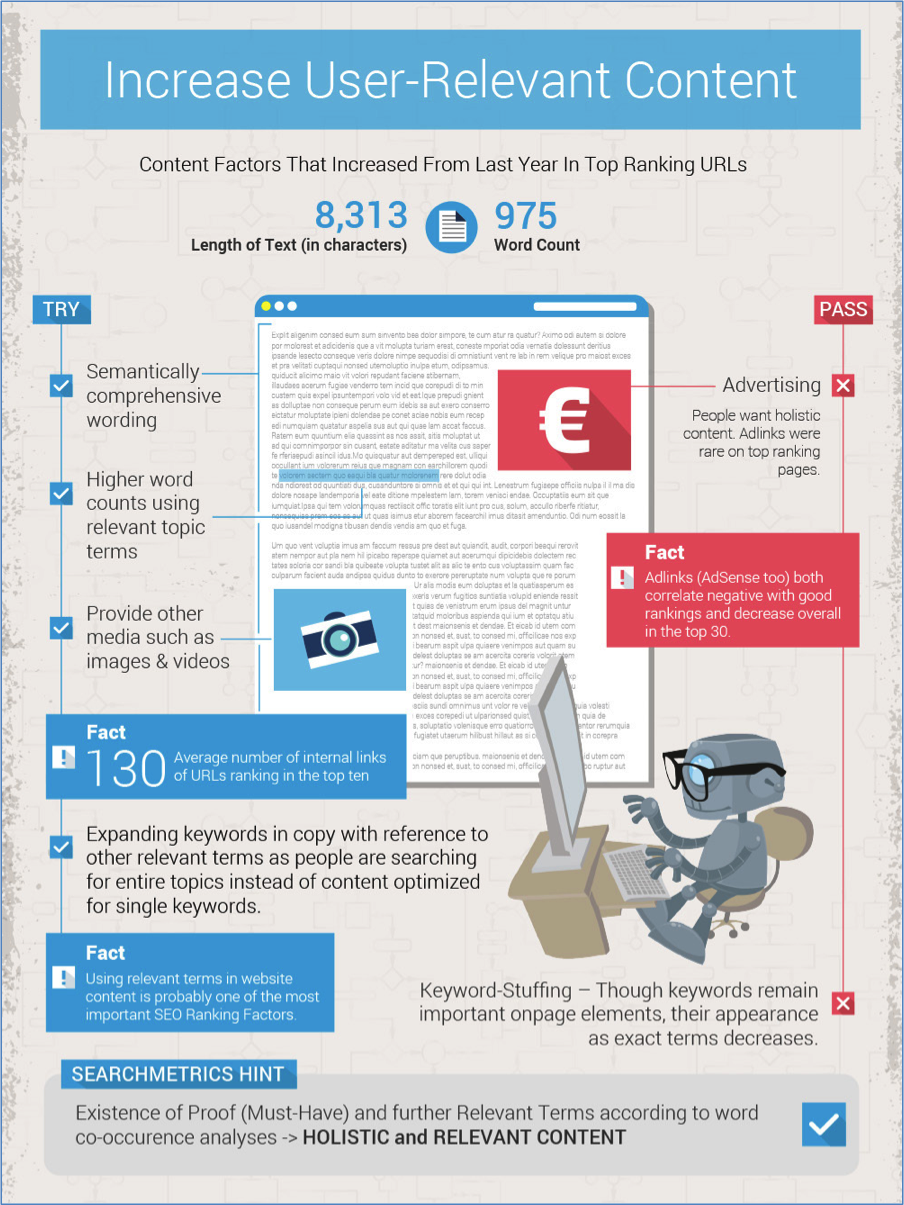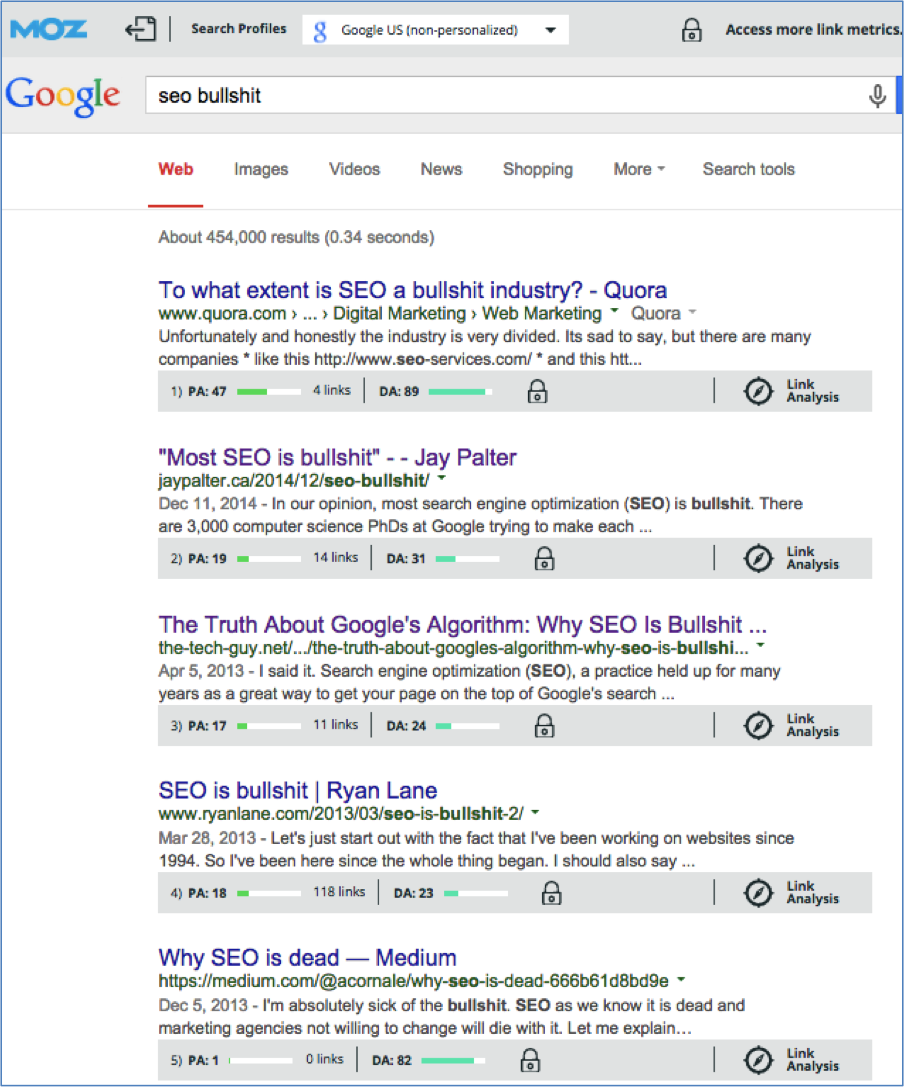I’m NOT calling SEO bullshit.
I’m not saying you don’t need to understand SEO. You do. And when you do, search will become a leading ingredient in your marketing mix and possibly the largest source of traffic to your website. (Psst… I simplified it for you here.)
I’m not saying you shouldn’t do SEO. If you’re doing content marketing, it comes with the turf. If you persist in knowing little or nothing about SEO, you’re sabotaging your success.
I’m not saying you shouldn’t hire SEO professionals. If you can’t parcel time to do the necessary research, link seeking and ongoing analysis, you should enlist the help of experts. It’s too important to ignore.
I wouldn’t be surprised if you’re still wondering…
Why the harsh title for this post?
I gave this post the title “SEO Bullshit” because we’re all up to our earballs in misinformation about the topic. It’s everywhere.
SEO BS is on your screen. You can clean your screen, but you can’t remove the BS. Ironically, if you do a search about search, your search engine will help you find it. Even the shysters can optimize a few pages.
 Bullshit gets reduced to birdshit in your Twitter feed.
Bullshit gets reduced to birdshit in your Twitter feed.
SEO BS is on your bookshelf. This is an unavoidable problem. You could have bought books from honest and legit authors who are SEO experts. If the book’s a few years old, much of its content probably stinks now.
SEO BS is in your inbox. Not true? I’m happy to share mine. I get email nearly every day from some “expert” who promises to quickly propel my site to the first page of search.
 My daily SEO offers come from a gmail address, so I can’t quickly research the companies.
My daily SEO offers come from a gmail address, so I can’t quickly research the companies.
They always make me wonder if the sender is so good at SEO why the need to send spam?
Wouldn’t the many companies in need of their services find them?
Sometimes the rules don’t apply
Check this out, a little exercise in search…
You see what I searched for. Now look at the results (which include data from the free MozBar browser extension). The top hit as well as the fifth have high authority ranks (PA and DA, per Moz, attempt to rate page authority and domain authority), but have earned 4 and 0 links. We’re supposed to believe links = authority. Sometimes the rules don’t apply.
Both the second and third results are brief, lightweight pages. We’re also taught quality, as measured in large part by depth, dictates what gets ranked highest. Again, sometimes the rules don’t apply.
I’m going to give you a fairly deep post and optimize the page every way I know how. My site’s DA is currently 47, not amazingly high, but higher than 3 of the top 5 results presented above. Will this post boot one of the top 5 down a notch? It could and possibly should. I don’t know what will happen because even when you understand and abide by the rules, they don’t always apply.
(2017 update: My DA is now 48 and a search for “SEO Bullshit” serves this article near the top of the page.)
Know why? SEO doesn’t have rules. We look to experts like Moz for helpful guidelines, research, and case studies. Their lessons are helpful. Sometimes.
We have the BS-SEOs to thank
People that do SEO tend to call themselves SEOs. They want us to believe they’re professional optimizers. Some are. I respect these people—the digital marketers who specialize in search—immensely.
But it can be challenging to quickly spot who’s full of it and who’s not. The first and most important test is to look for guarantees. Guarantees are BS.
Real SEO pros can guarantee to work diligently on your behalf to generate qualified leads via search. That’s all they guarantee. BS-SEOs tend to guarantee rankings.
I don’t want you to buy their bull. Ask yourself these questions before buying into any SEO service agreement.
- Will the SEO company audit your website? This is a necessary first step. Companies that want to jump right into getting you links are reckless.
- Are you being promised high rankings? Run for it. One, this is not a trustworthy promise. Two, SEO is marketing. High or otherwise, rankings only matter if they drive qualified prospects to your website and help achieve your marketing goals.
- Will the SEO company school you? How much you want to understand and be involved in SEO is up to you, but what they’re doing should never be a mystery.
- What will you get? The answer needs to be reports, insights and action plans based on them. SEO is an ongoing process. Don’t buy campaigns, any sort of backlinks blitz or x-thousand hits on your site.
BS detectors
Be on the lookout for the things the scammers say and do.
- Game the system—No one’s going to admit to doing this, but that won’t stop them from using black hat (unethical) tactics to get good short-term rankings. If you’ve paid any attention at all in recent years, you know Google has revamped their algorithm to not only detect the gamers, but also penalize them.
- High speed, volume link building—This is the gamer’s stock in trade. They spam the web with links, duplicate articles, blog comments, and get you links on tons of worthless directories.
- Buying links—Red flag of the highest order. Real SEOs don’t buy links. Some slime balls will tell you they don’t have to because they own high value domains. Don’t go there.
- SEO writing—Being a writer, I’m particularly annoyed with this pitch. A search savvy writer doesn’t do “SEO writing.” He or she creates relevant content and optimizes it properly.
- Promises rankings—This one deserves a second mention. Don’t be fooled into believing rankings are all you need.
- Secrets—Here’s a not so secret secret: there are no secrets. Or you might say SEO is one big secret because search engine companies keep their algorithms secret. A company that claims to have secrets guaranteed to propel you to #1 rankings is a turd. Guaranteed.
SEO probably changed today
You simply need to accept this. You may not like having to concede the teams behind the search engines are working daily to tweak the algos, but if you’re a content marketer, you probably should.
The search engine’s goal is to reward the best content creators. Your goal should be to become one.
The unsolvable mystery all across the SEO universe is what factors affect your rankings. Experts will tell you the list may be as long as 200. But beware: if they go on to tell you how your use of a tactic CAUSES your rank to increase or decrease, they’re not actually experts; they’re liars.
The true experts steer clear of proclamations about causation because they know they can’t deliver proof. Instead, they deliver data and insights about CORRELATION.
I’ll demonstrate by highlighting the hotly debated topic of “social signals.” First, there should be no debate. Google said social signals are not a ranking factor. So for now, they’re not. Note they did not say social signals will NEVER be a ranking factor, right? They could, and likely will, change their tune.
Now, one of the most respected voices in SEO is Searchmetrics. Their 83-page white paper, “SEO Ranking Factors and Rank Correlations 2014,” is one of the deepest studies on the topic I’ve seen. It’s also the most recent of its kind.
The research says social signals is the area with the highest correlations to high rankings. “In other words, good ranking URLs have many shares, likes, comments, +1s and tweets,” they wrote.
If you’re not confused enough, I’ll add that it’s almost universally agreed that a high level of social media activity indirectly affects search rankings because it affects many of the factors that do affect rankings. But today, social signals are not a ranking factor. Okay?
So now I want to share some of the conclusions from the report to:
- Help calibrate your BS detector and not be misinformed about false or old information about ranking factors.
- Spare you from having to read it if you don’t want to. It’s informative, but sleepy.
Ranking correlations you want to know
Searchmetrics reports:
- The days of keyword density are over.
- High quality, relevant content is the focus of search. It is identifiable by higher word-count and semantically comprehensive wording. It’s often enriched by images and video.
- To further understand the point above, realize Google recognizes “content clusters,” which means variations of the keywords that are developed naturally in the copy.
- Keywords remain vital, but the trend is moving away from a single keyword towards entire topics.
- The quantity and quality of backlinks remains crucial.
- Search results vary and are influenced by personal search history.
- Search engines do not favor pages that meet certain technical on-page criteria (load speed, length of URLs, position of keyword in title, etc.). However, the absence of these criteria have a negative effect on ranking.
- Pages in top search positions have comparatively more internal links than those further down the rankings.
- More advertising integrations correlates to lower rankings.
- Backlink quality factors are probably the most important SEO metric on the “off page” side.
- Correlated for search results, click-through rate is the highest ranking factor.
- User signals including time on-site and bounce rates are strong quality signals.
- SERPs for mobile are different.
- A good search position cannot simply be achieved by ticking a few of these boxes. Search engine assessment is multi-faceted.

Searchmetrics’ report features several infographics. This is the most helpful of them
because increasing relevant content is the most important thing you can do.
What’s next for SEO?
And now for what’s going to happen next, or at least, what some experts see coming in 2015 and beyond…
Real Estate on the Small Screen
 “In 2015, I’d pay very close attention to Google’s expansion of Knowledge Graph. Human-curated data is showing its limits, so Google is trying hard to produce direct answers from the index (read that: ‘our sites’). They started pushing out index-driven answer boxes in 2014 and I’d expect those to expand significantly next year. I’d also expect those answers to become more reliable as Google’s capabilities improve. These direct answers will impact more and more verticals, and could dramatically change CTR, especially for mobile SERPs (where the answers take up a lot of screen real estate).” ~ Dr. Peter Meyers, Moz @dr_pete
“In 2015, I’d pay very close attention to Google’s expansion of Knowledge Graph. Human-curated data is showing its limits, so Google is trying hard to produce direct answers from the index (read that: ‘our sites’). They started pushing out index-driven answer boxes in 2014 and I’d expect those to expand significantly next year. I’d also expect those answers to become more reliable as Google’s capabilities improve. These direct answers will impact more and more verticals, and could dramatically change CTR, especially for mobile SERPs (where the answers take up a lot of screen real estate).” ~ Dr. Peter Meyers, Moz @dr_pete
Mobilizing Forces
 “In 2015, I see a big shift in mobile SEO. Mobile devices have been growing in popularity, but companies haven’t been optimizing for mobile search. Having your website SEO friendly isn’t enough… You need to also think about the mobile web when optimizing for search. Some of the companies doing this are already receiving more than 50% of their organic traffic from mobile devices.” ~ Neil Patel, entrepreneur @neilpatel
“In 2015, I see a big shift in mobile SEO. Mobile devices have been growing in popularity, but companies haven’t been optimizing for mobile search. Having your website SEO friendly isn’t enough… You need to also think about the mobile web when optimizing for search. Some of the companies doing this are already receiving more than 50% of their organic traffic from mobile devices.” ~ Neil Patel, entrepreneur @neilpatel
I have some mo’ mobile for you…
Couch Potato Domination
 “It’s no secret that mobile and tablet search is growing tremendously, even outpacing desktop search in many categories. The day of thinking about a website’s mobile experience last (if at all) is over. The couch will be the preferred point of conversion for many brands with mobile sites tailored to the medium. Brands that want to remain relevant in 2015 must have a mobile-first mindset.”~ Jayson Akers, Digital Current @azakers
“It’s no secret that mobile and tablet search is growing tremendously, even outpacing desktop search in many categories. The day of thinking about a website’s mobile experience last (if at all) is over. The couch will be the preferred point of conversion for many brands with mobile sites tailored to the medium. Brands that want to remain relevant in 2015 must have a mobile-first mindset.”~ Jayson Akers, Digital Current @azakers
Lights Out Long-Tail
 “Watch out for the death of the long tail keyword. Long tail keywords started to go out of style after Google’s Panda update. That update made long tail-focused content farms like Ehow.com obsolete and invisible in Google. Semantic search and Hummingbird made long tail keywords even more irrelevant. Back in the day, it made sense to have two separate pages for the keywords ‘best baking tips’ and ‘top baking advice.’ Thanks to semantic search, Google will show the same results for those two keywords.”~ Brian Dean, Backlinko @backlinko
“Watch out for the death of the long tail keyword. Long tail keywords started to go out of style after Google’s Panda update. That update made long tail-focused content farms like Ehow.com obsolete and invisible in Google. Semantic search and Hummingbird made long tail keywords even more irrelevant. Back in the day, it made sense to have two separate pages for the keywords ‘best baking tips’ and ‘top baking advice.’ Thanks to semantic search, Google will show the same results for those two keywords.”~ Brian Dean, Backlinko @backlinko
Let’s Go SERPin’ Now
 “SERPs changed a lot in 2014 and they’ll change even more in 2015. Here are some changes you might see:
“SERPs changed a lot in 2014 and they’ll change even more in 2015. Here are some changes you might see:
- More prominent local listings, including a redesigned carousel
- More ads, including a possible experiment of images within AdWords ads
- App results for people searching on smart phones
“I don’t expect we’ll see more rich snippets in organic listings, since these draw attention (and revenue) away from PPC ads. We may see even fewer rich snippets, as we did this year with the end of Google Authorship.”
~ Andy Crestodina, Orbit Media Studios @crestodina
Death by Integration
 “Search is alive. SEO is dying (for real this time). Long live customer-focused, integrated marketing.” ~ Lee Odden, TopRankMarketing.com @leeodden
“Search is alive. SEO is dying (for real this time). Long live customer-focused, integrated marketing.” ~ Lee Odden, TopRankMarketing.com @leeodden
Interesting, eh? Lee wrote the book, “Optimize.”
Prime Real Estate

“Today, 85% of search results on Google is comprised of Knowledge Graph, maps, local, wiki, news, social media, carousel, images, videos, Amazon, Yelp, and other content aggregators and rich media. So, one SEO trend that will be the winner in 2015 is your ability to ‘show up’ on the platforms and technologies that take up the hottest real estate in Google and look outside your website for ranking opportunities. That’s where I am putting my money and efforts.”~ Matthew Capala, SearchDecoder @SearchDecoder
One More Answer About Answers
 “Watch for big expansions in the Knowledge Graph/Answer Box in Google’s search results. This is a major strategic initiative for Google and getting a lot of resources. The changes will come in many forms including: direct answers to simple fact-based questions (such as how many quarts in a gallon); answers derived from third party web sites, such as their step-by-step instructions.” ~ Eric Enge, Stone Temple Consulting @stonetemple
“Watch for big expansions in the Knowledge Graph/Answer Box in Google’s search results. This is a major strategic initiative for Google and getting a lot of resources. The changes will come in many forms including: direct answers to simple fact-based questions (such as how many quarts in a gallon); answers derived from third party web sites, such as their step-by-step instructions.” ~ Eric Enge, Stone Temple Consulting @stonetemple
[The predictions above come from a post I wrote for Digital Current.]
All you can do is listen, learn and experiment
I didn’t mean to confuse you. But I’m not pretending I can clarify the current state of SEO for you. Again, the most timeless tip is to create useful content. It’s the one piece of advice that will never be BS.
Additionally, I recommend you learn enough to recognize crap advice when you hear it and steer clear of the BS artists. And finally, recognize the way SEO works changes constantly.
Trust me on that, but stay tuned.







![The Most Common & Costly SEO Mistakes [Content Jam Episode 35] The Most Common & Costly SEO Mistakes [Content Jam Episode 35]](https://feldmancreative.com/wp-content/uploads/2018/09/Content-Jam-podcast-35.png)
Comments
Don Sturgill
How to provide relevant content without using appropriate keywords? Oh, yeah, the new terms are “semantically comprehensive” and “relative to topic.” That’s a huge change 🙂 Google will definitely reward you for that. Stop the presses.
Chris Willis
I love the way you referenced and embedded a supporting infographic in your discussion of infographics and SEO. Your handling of high value referenced testimonials is nothing short of brilliant. Beyond relevant and useful content, your presentation is like a content marketing master class. No BS. This is why I continue to follow you. Thank you for continuing to educate me.
Barry Feldman
Chris,
Awesome feedback. Thanks so much for the comments and support. (And feel free to say something like that on LinkedIn.)
Raul Cabrera
big kudos for this one Barry, great article. I wish every business owner could read it to avoid scammers
Barry Feldman
Thank you. Spread the word my friend.
Raul Cabrera
Done XD
My best
Mathieu Powell
Thanks for a comprehensive article on SEO Barry. I’ve paid my dues and waded through plenty of SEO B.S. It’s delightful to find a veteran who has seen it all.
100 Ways Your Company Loses to Better Online Marketers | Feldman Creative
[…] source, search engine optimization will remain a key priority in any digital marketing mix. While SEO continues to confound so many companies, it’s become a far simpler animal in recent […]
Evan Wilkins
Such a useful tip you have written in this blog, it will be needed by so many. So keep sharing such kind of information. Thanks for sharing this.